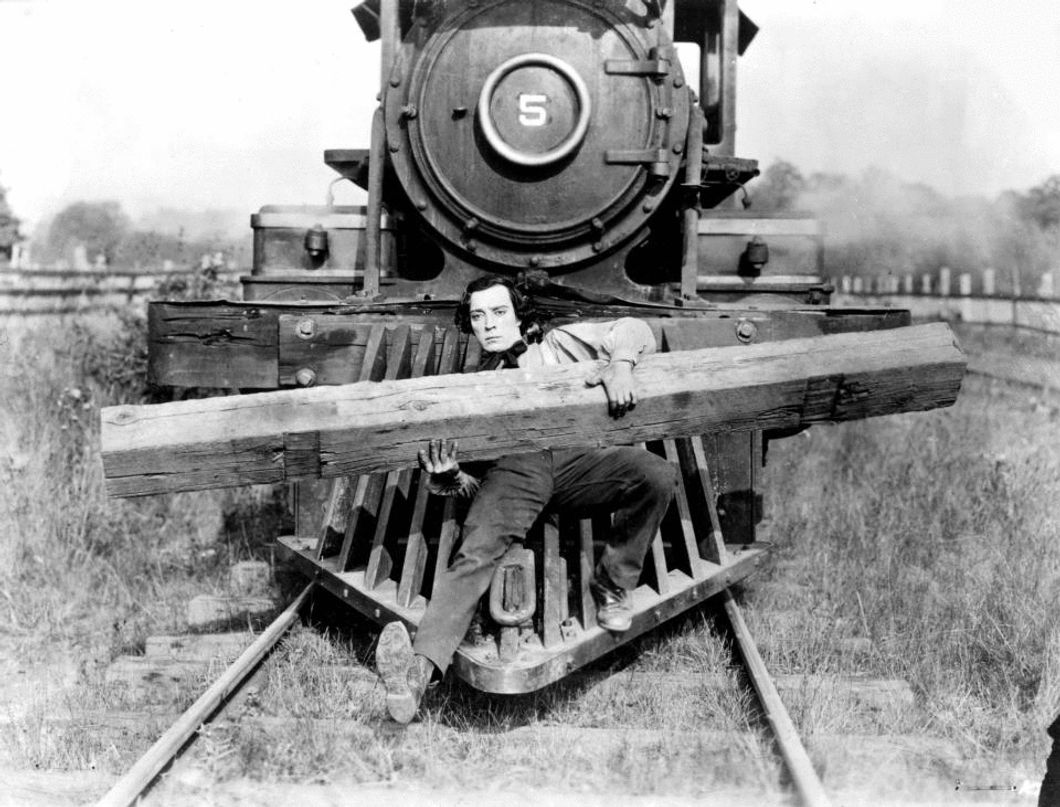When most people think of silent comedy, there is typically one name that first comes to mind and that's Charlie Chaplin. Chaplin is typically thought to be the king of silent comedy, and while I agree that he was certainly a good silent comedian, I personally wouldn't crown him king. For me, that award goes to Buster Keaton. The name Buster Keaton isn't as common, but he is fairly well known by those who enjoy silent comedies and especially by film enthusiasts.
The Great Stone Face
Unlike Chaplin and Lloyd, two other famous silent film comedians, Keaton used his iconic deadpan expression as a way to make his acts that much more comedic. This facial expression is what earned Keaton his nickname 'The Great Stone Face.' The reason why this facial expression is considered to be one of the best pars of Keaton's character is because his movies are famous for always having the most ridiculous things happen, from a runaway train to a house falling almost directly on top of him, it would make sense for the main character to overreact and use a range of overdramatic facial expression. But throughout all of these events, Keaton consistently remains calm and handles the situation accordingly.
No such thing as a Retake
Back in the silent comedy era, special effects were limited. So in this era, you either did the event for real, or you didn't do it at all. When you watch a Buster Keaton movie just remember this, every event that happens on that screen, actually happened. One of Keaton's most famous films "The General" includes a scene where a bridge explodes. If you were to watch a movie in this day and age that included a scene with an exploding bridge, you probably wouldn't think twice about it. But in Keaton's time, that scene with bridge exploding is what made "The General" the most expensive movie of that era. Because in order to film that scene, they truly did have to blow up a bridge. On top of that, imagine the devastation that would have erupted from the film crew if something went wrong with the shot. Maybe the camera operator forgot to turn the camera on, or the framing was all wrong and the explosion was off center. There was no such thing as a take two. You used the original and that was that.
"Keep Rolling Unless I Die"
Keaton always performed his own stunts. Even if other deemed them too dangerous for him to do. Keaton is often quoted as saying "keep rolling unless I die" to his crew during a particularly dangerous stunt. Keaton also refused to attempt the same stunt more than once. He believed that if you didn't get it right on the first try, then it should just be cut from the film. This is what, for me at least, makes Keaton so much more than just another silent comedian. Keaton worked hard to make sure his stunts worked on the first try and that he was the one performing it, because if that wasn't the case, then to him there was no point in doing the stunt at all. In Keaton's film "Steamboat Bill Jr." a house practically falls on top of Keaton who did this scene himself. The stunt was thought to be so dangerous hat half the crew refused to watch as the front of the house came crashing down. But Keaton survived and walked away from it unscathed.
The Best Silent Comedian of all Time
Buster Keaton is a man who truly loved his work. But once the sound era rolled around Keaton, and many other silent comedians like him, found themselves unable to adapt to this new way of movie making. But Keaton will always be remembered through the actors and other filmmakers he inspired. Take Jackie Chan, for example, if you do a side by side comparison of the stunt work done by both Chan and Keaton, you'll be surprised by the number of similarities you see between the two. These are just a handful of reasons why Buster Keaton is by far the most iconic silent comedian to have ever been on the big screen.
















